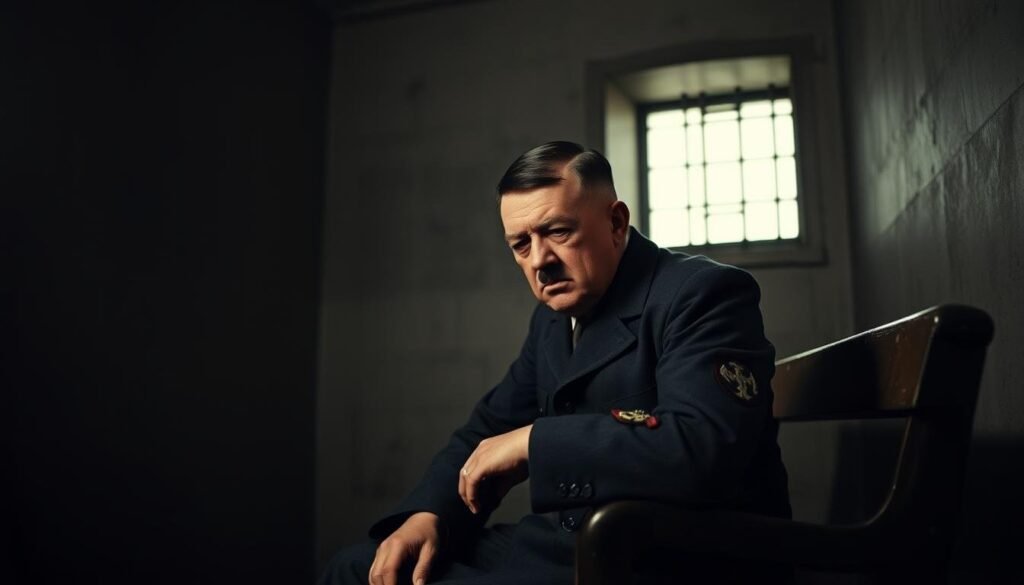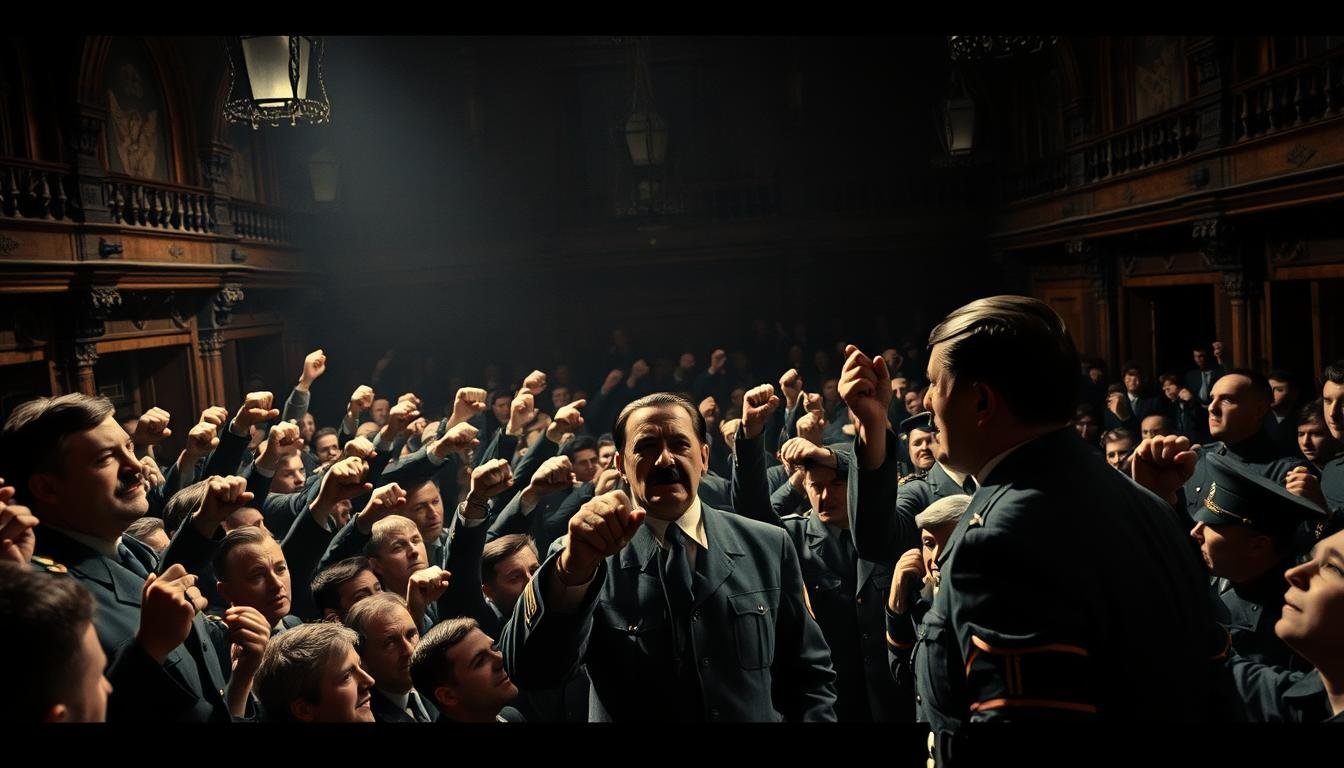Did the Beer Hall Putsch Make Hitler More Popular? You might know about a key event in history that changed Adolf Hitler’s path. The failed coup in Munich was a turning point for him. It has caught the eye of many historians.
In 1923, the event marked a significant moment in Hitler’s life. Though it failed, it made him famous nationwide. It also set the stage for his rise to power. You’ll see how this event boosted Hitler’s popularity and its role in history.
By learning more about this event, you’ll understand its importance. You’ll see how it helped Hitler gain more influence.
Contents
- 1 The Beer Hall Putsch: Historical Context and Events
- 2 Immediate Aftermath: Hitler’s Trial and Imprisonment
- 3 Did the Beer Hall Putsch Make Hitler More Popular?
- 4 Strategic Lessons and Political Evolution
- 5 Conclusion: Did the Beer Hall Putsch Make Hitler More Popular?
- 6 FAQ
- 6.1 What was the Beer Hall Putsch?
- 6.2 When did the Beer Hall Putsch occur?
- 6.3 What were the immediate consequences of the Beer Hall Putsch for Hitler?
- 6.4 How did the Beer Hall Putsch affect Hitler’s popularity?
- 6.5 What strategic lessons did Hitler learn from the Beer Hall Putsch?
- 6.6 How did the Beer Hall Putsch influence the Nazi Party’s future?
The Beer Hall Putsch: Historical Context and Events
On November 8, 1923, Adolf Hitler and his followers started the Beer Hall Putsch. This was a big try to take over power in Germany. It happened because of the political and economic problems of the Weimar Republic era.
The Weimar Republic was set up after World War I. It had big issues like hyperinflation and political trouble. The Nazi Party, led by Hitler, used this to promise a better future for Germany.
- The Putsch started with Hitler and his group taking over a beer hall in Munich. There, Bavarian officials were meeting.
- Hitler said the “national revolution” had begun. He wanted to take down the Weimar Republic government.
- The coup didn’t work out because local authorities and the German army stayed true to the government.
- Hitler was caught and charged with treason.
The Beer Hall Putsch was a key moment for the Nazi Party and German politics. Even though it failed, it made Hitler famous. It also helped him plan his next steps to power.
This event changed Germany’s politics in the 1920s. The Putsch’s failure made the Nazi Party rethink their strategy. They moved from trying to take power by force to a more careful, legal way.
Immediate Aftermath: Hitler’s Trial and Imprisonment
Hitler’s trial after the Beer Hall Putsch was a key moment in his rise. The trial in 1924 brought a lot of attention to Hitler and his views. The Weimar Republic’s legal system inadvertently provided Hitler with a platform to promote his nationalist agenda.
Hitler showed his charm and speaking skills during the trial. He tried to win sympathy and support from the public. He said he was a patriot fighting against the Weimar Republic’s injustices. This message struck a chord with many Germans who were unhappy with their situation.
Imprisonment and Its Consequences
Hitler got five years in prison but only served nine months. His time in prison was comfortable, allowing him to write Mein Kampf to his deputy Rudolf Hess. This time helped him solidify his ideas and gain more popularity.

The trial and imprisonment had big effects on Hitler and the Nazi Party. The trial made Hitler a well-known figure in German politics. After getting out of prison, Hitler focused on growing the Nazi Party. He used a smarter strategy to gain power in the Weimar Republic.
| Event | Date | Consequence |
|---|---|---|
| Beer Hall Putsch | November 8-9, 1923 | Failed coup attempt |
| Hitler’s Trial | February 24 – April 1, 1924 | Increased popularity for Hitler |
| Imprisonment | April 1, 1924 – December 20, 1924 | Dictation of Mein Kampf |
The events after the Beer Hall Putsch, including Hitler’s trial and imprisonment, were crucial. They gave him a national stage and helped him strengthen the Nazi Party.
Did the Beer Hall Putsch Make Hitler More Popular?
Exploring the Beer Hall Putsch’s impact on Hitler’s image is key. This 1923 coup attempt by Hitler and the Nazi Party was a turning point in his power rise.
The Putsch’s immediate response was mixed. Some saw it as a bold, though failed, challenge to the Weimar Republic. The trial that followed, however, greatly increased Hitler’s national fame. During the trial, Hitler shared his ideology, winning sympathy and attention from many Germans.
Public Perception and Reaction
Media coverage of the trial shaped public views of Hitler and the Nazi Party. Newspapers across Germany highlighted Hitler’s defiant words and the Putsch’s drama. This coverage solidified Hitler’s national presence.
Reactions to the Putsch were varied. Some Germans saw Hitler as a patriot challenging the status quo. Others saw him as a threat to stability. The Nazi Party used the trial’s sympathy to advance their cause.
| Aspect | Pre-Putsch | Post-Putsch |
|---|---|---|
| Public Awareness | Limited to Bavarian region | National attention across Germany |
| Media Coverage | Minimal, localized reporting | Widespread, national media coverage |
| Nazi Party Membership | Relatively low | Significant increase in membership |
The Beer Hall Putsch was a turning point for Hitler. It made him a nationally recognized leader from a relatively unknown figure in Bavaria. The event and its aftermath were crucial in shaping public views of Hitler and the Nazi Party.
In conclusion, the Beer Hall Putsch boosted Hitler’s popularity, mainly due to media coverage and the Nazi Party’s ideology promotion. This event was a key step in Hitler’s rise to power.
Strategic Lessons and Political Evolution
Hitler thought deeply about the Beer Hall Putsch failure. He learned important lessons that helped him plan better for the future. This moment was key in his journey to power.
Evolution of Hitler’s Political Strategy
After the Beer Hall Putsch, Hitler changed his approach. He moved from armed actions to using legal and political ways to get ahead. He became more involved in German politics through the Nazi Party.
Hitler learned a lot from the Beer Hall Putsch. He saw how important legal and political steps were to gaining power. This made him more careful and strategic in his political goals.
| Strategic Lessons | Pre-Putsch Approach | Post-Putsch Approach |
|---|---|---|
| Use of Force | Relying on armed insurrection | Shifting to legal, political maneuvering |
| Political Participation | Limited engagement with existing political structures | Increased participation through the Nazi Party |
| Public Perception | Creating a martyr image through trial | Building a political base through propaganda and public speaking |
Hitler’s strategy shift had a big impact on German politics. His new tactics helped the Nazi Party grow and eventually take power. These lessons show how Hitler skillfully changed the political scene.
Conclusion: Did the Beer Hall Putsch Make Hitler More Popular?
The Beer Hall Putsch was a key moment in Hitler’s rise to power. Although it failed, it made Hitler famous across Germany. This boosted his standing within the Nazi Party.
Hitler’s trial and imprisonment turned into a chance to gain more support. It solidified his role as a major figure in the party. The lessons learned from this time helped shape the Nazi Party’s future strategies.
Looking back, the Putsch’s impact is clear. It shows the complex journey of Hitler’s rise to power and the unstable politics of the Weimar Republic. The Beer Hall Putsch was a turning point for the Nazi Party, not just a failed attempt.
See Also: What Groups Did Hitler Consider Undesirable?
FAQ
What was the Beer Hall Putsch?
The Beer Hall Putsch was a failed coup attempt by Adolf Hitler and the Nazi Party in 1923. They aimed to overthrow the Weimar Republic government in Germany.
When did the Beer Hall Putsch occur?
It happened on November 8-9, 1923, in Munich, Germany.
What were the immediate consequences of the Beer Hall Putsch for Hitler?
After the Putsch failed, Hitler was arrested and tried for treason. He was imprisoned for nine months. During that time, he wrote his memoir, Mein Kampf.
How did the Beer Hall Putsch affect Hitler’s popularity?
The Putsch made Hitler more popular. His trial and imprisonment made him seem like a martyr for the Nazi cause.
What strategic lessons did Hitler learn from the Beer Hall Putsch?
Hitler learned the value of legality. He realized the need to gain power through democratic means. This led to a change in the Nazi Party’s strategy.
How did the Beer Hall Putsch influence the Nazi Party’s future?
The Putsch was a turning point for the Nazi Party. It increased their support and set the stage for their rise to power. They adopted more practical political strategies.

Jayceon Schaefer, a social worker from Wailuku, Hawaii, is passionate about history. He created HitlerStory.com to share his deep interest in Adolf Hitler and explore complex historical topics through writing.

